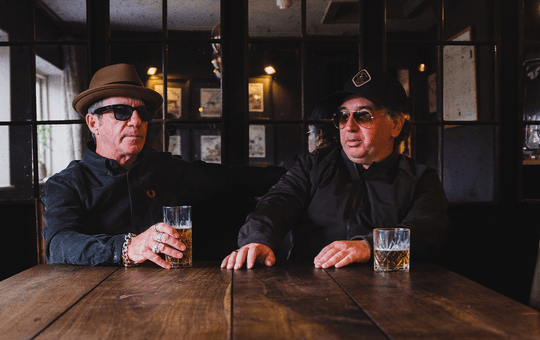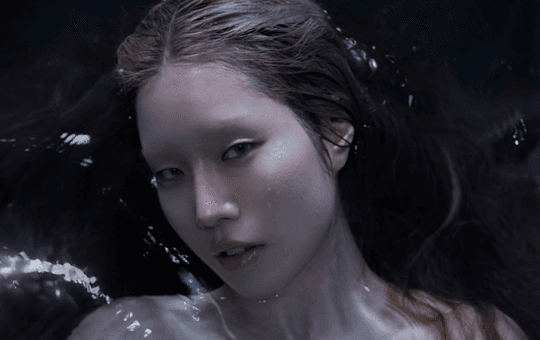Dummy Mix 161 // Glasgow Spotlight Vol. 1: Mother
Text: Lauren Martin
As a Glaswegian born and bred, I am often asked by friends and eager strangers alike about Glasgow and its music scene. I never tire of it. Such is the wealth of my home’s creative underground that no two answers I give are ever quite the same, and the constant shifts in dynamic and content within this culture speak to something I see as quintessentially Glaswegian. The cult status of bands like Mogwai, Arab Strap and Belle and Sebastian, as well as the ‘Caledonian miserablism’ of relative newcomers in Twilight Sad and Frightened Rabbit, harks to a deep romanticism of the tenement-lined, overcast streets of Glasgow by its natives that is laced with a self-deprecating humour that’s both balanced out and bolstered by our passion for late, late nights and a sense of “fuck it, get on with it” togetherness that I feel – perhaps with bias – is unparalleled.
Glasgow can be scathing in its bleakness, yet like so many post-industrial urban spaces, it’s a city that places this bleakness front and centre with a steely gaze and wry smile. It’s always been determined to do something new and worthwhile, take that endeavour seriously but, importantly, not to take itself too seriously in doing so. It’s this constant, natural doubling that runs like a coarse, steady thread through every creative discipline here, and what makes music in particular here so vital, boundary-pushing and respected.
Many who will have heard of Glaswegian success stories like LuckyMe and Numbers may be aware of the years of hard work that put them there, yet as with every city, there’s also those who contribute to the fabric of the underground a sidestep out from the glare of this international spotlight. There is a wealth of talented, forward-thinking individuals that make up the collectives, labels and club-nights that contribute to the musical cultures of our respective cities. They’ve put in years of devoted service in the name of a damn good time (and often for little more than the enjoyment of it) and it’s these figures that paradoxically solidify and re-fashion the ever-changing face of underground musical culture on our doorsteps.
As a rare glimpse into such inner workings, Dummy now introduces the Glasgow spotlight mix series; where local figures take a moment to present themselves and what they do outwith the city boundaries. First up in the series is Mother, AKA Mark Maxwell, who worked as John Peel’s assistant in the early 2000s on his seminal BBC Radio 1 show. After Peel’s death Maxwell went onto become one of the resident DJs at Fortified Sessions, the original crew of devotees that brought dubstep in its earliest forms to Scotland. Fortified Sessions hosted the likes of Mala, Loefah, Kode9, Skream and a wealth of others in the mid to late 2000s whilst running a direct parallel to London’s FWD and DMZ nights in terms of energy and willingness to push new, barely-defined sounds, and later went on to become the label Fortified Audio. In the years since the Sessions, Maxwell has run The New Backwards project and is now resident for This Is Our House. His DJ sets have garnered a reputation for their immaculate curation and willingness to explore the darkest recesses of techno, house, ambient noise and every weird facet in between, and its his wealth of musical knowledge and attention to detail that makes his our first contributor to the series.
Hi! Please introduce yourself and tell us what you do.
My name’s Mark Maxwell. I’m known by the name my mother gave me and also, interestingly enough, by the name Mother. That choice of alias wasn’t a tribute to her though. I’ve been DJ’ing for around thirteen years, here and there, and occasionally make music. I dabble in home-brewing and music related writing now and again, as well as being a postman and working for Rubadub, which is a record and music gear shop here in Glasgow.
How would you describe your tastes, and what kind of sounds really grab you?
I’ve always wondered if there was some underlying thing connecting all the music I’m interested in, but I think it forms in clusters as opposed to being an all-encompassing thing. There will be certain things I like about a metal track that I’ll identify with in a techno track because it’s more about moods and vibes, for want of better terms. A good chunk of the music I like is instrumental, and maybe that’s because of the ambiguity in pinning down emotions. I think that’s why people struggle to describe it in a meaningful fashion – especially electronic music.
You previously worked with John Peel. How and when did that begin, what did you do with him in a working capacity and what was the whole experience like?
Yeah, I started working on John’s show at Radio 1 as a sort of broadcast assistant/trainee type of gig around 2003/04. Besides the working relationship we just hung out, listened to and talked about music, and drank a lot of red wine. A lot of shows are producer-led but as you could imagine, John’s wasn’t really one of those shows. There was still plenty to do behind the scenes though and all who worked on the show had a lot of creative input.
The job was great in itself but for me it was an important personal experience. John was, as they say, a diamond geezer. I was a bit intimidated at first by the whole thing, as I’d never done anything like that before in my life, and I was pretty young at the time, but John wasn’t shy. Maybe unassuming. The more I got to know him the more I realized how much we had in common in terms of our outlook on music. John had a juvenile fascination with music, and I mean that with the highest of compliments. That’s why his show was the way it was. He cared about music but was indifferent to a lot of the bullshit that can come along with it. And I think most folk are actually the same. That’s why the show was so popular for so long.
Working with him also confirmed something I’d always thought, which is that music can be fucking ridiculous and credible at the same time. He didn’t play twenty second grindcore tunes for the novelty of it, but understood that it was slightly daft but also incredible about it all. For me, the most important thing about John’s legacy was not all the bands he discovered who went on to be famous, but all the challenging and dynamic music he pumped out on what was – well, is – arguably one of world’s biggest radio stations, on a prime-time slot. And people fucking loved it! Apparently, that show had the biggest shares of the youngest listeners than any other specialist show on Radio 1 at the time. That’s a beautiful thing, and a strong message to all those hell bent on underestimating their audience.
What did you do after Peel died?
I worked at Radio 1 as a freelancer for a bit. There was talk of me going to work for John
privately in some capacity and I don’t really think I made myself clear in how much I would have loved that at the time, but I would have. After he died though I just floated around at Radio 1 for a bit, but I was young and maybe wasn’t as dedicated as I could have been. Truth be told, I wasn’t really committed to Radio 1 anyway. It was getting more and more obsessed with becoming a brand and that had a detrimental effect on its output. If I’d ended up working on a show that I would’ve personally listened to, then it might have been a different story. Then I moved back here because I was sick of being piss poor in London. Glasgow’s a much easier place to be piss poor in. If I’d taken some Tory advice I might be Director General of the BBC by now. But probably miserable.
You’ve become know for your very atmospheric DJ sets. How would you prepare for a set?
If I’m playing a warm-up slot or in a place where you’re afforded more liberties, then I do a healthy amount of preparation. That usually involves going through a lot of records, finding ones that blend well with other ones, looking for entry and exit points and so on. It can be pretty time-consuming but I like doing it. There’s an element of craft in that method. If I’d gonna be frank though, I don’t really buy into all this “you gotta read the crowd” shit. I think that’s a throwback from the golden days of Ron Hardy etc. The reason why Ron Hardy could read a crowd like an open book is because half the time he played he knew most of the people in the room. The reason he was the fucking man is because he was challenging audiences that were ready and willing to be challenged, and did it with flare. When I go and see someone play, I wanna hear what they’ve got to say, not what I want them to say.
Also, raising the old vinyl vs digital debate, where do you stand on this? There are merits and pitfalls to both obviously but, it would be good to pick your brain on it.
I play only vinyl simply because I love it. I love everything about it in fact, and not just in a DJ context. I’ve got nothing against people who use Traktor or controllers or whatever. However the main reason I see Traktor/Serato/Controllers (and digital formats in general) existing for is convenience. Which is great, we all love convenience, but it doesn’t always run in tandem with pleasure. For me, the pleasure of having a solid slab of wax in yer mits far outweighs convenience. A record is a whole work of art, from the music in its grooves to the design on its sleeve or label. The very production of vinyl is a true craft, from mastering to manufacturing.
I sometimes get hit with the old “it should be only about the music!” chat. Well, music doesn’t exist in a bubble. It’s an intrinsic part of human creativity that’s linked with a myriad of other creative endeavors, and the best way to realize that is to simply look at a record. Then play it. I feel that a lot of folk are seeing music now as if it materializes out of the ether and gets beamed into their phones, computers and MP3 players by wizards who they care not to know of. That’s simply not the case. We should recognize people’s achievements and do them justice, and records are a good way to do that.
Who else in Glasgow do you support and enjoy musically?
In terms of DJs: Fergus Clark, The Guild of Calamitous Intent, Martin McKay, Dan and Kenny from DABJ, Gary, Gordon and Barry from Work For Love, J.P McLaughlin, Optimo, David Barbarossa, the All Caps crew, Not Moving . There’s so many people who play good music here. Sometimes it’s in their bedroom, sometimes it’s in a club. That’s just a few of particular note, but there’s more I like. Those who make music would be folk like TVO, Divorce, Ultimate Thrush, Silk Cut, Pub and the Ampoule crew, Jailbreak, Usurper.
How do you view the growth of Glasgow as a musical city, particularly within electronic music, and how clubs (and their international reputation) have developed?
Glasgow’s always been a very creative place right across the board from visual art to music and everything in between, and they all feed into each other here. I think Glasgow has been steadily growing in terms of willingness to embrace a wide array of music, but I do see a problem arising in that Glasgow club nights are becoming more and more obsessed with well-known guests. I think it’s great to be able to see so many different and talented people play in your city, especially when you consider that some cities and towns don’t have shit in this respect, but I think it has a bit of a detrimental effect on folk who just wanna do their own thing without having to cough up serious cash for guests.
I think a lot of people here are a bit too caught up in the hype of big names to notice the wealth of talent right under their noses. It’s really down to the punters whether smaller nights can be successful or not, so give ‘em a chance! But yeah, I can see why people from elsewhere see the steady flow of great musicians and DJs who pass through here every week and think “fucking hell, I wanna go there!” When you look to the fringes and the sub-underground here, you see that it’s fucking teeming with exciting bands and artists.
Do you see this international focus on Glasgow in terms of crowds, venues and talent as an accurate reflection of the city as a Glaswegian?
Yeah, I mean the old saying that Glasgow has some of the best crowds is generally spot on. We’re not afraid to let our inhibitions go and really make the most of a party. And on the other side of the coin we have an abundance of other interesting and engaging events. Then again, Glasgow can be a pretty grim place. Maybe some folk listen to artists like Hudson Mohawke and Rustie and build this picture of Glasgow up in their heads, all based on that music. I don’t think that kind of thing is very reflective of what Glasgow is like as a city.
But then again, why should it be? If anything, it’s probably more about escapism. And I can see why people think Glasgow is a beautiful city, because parts of it most certainly are. I work in a pretty deprived area though. I see the darker side of Glasgow every day. I think that darker side could be embraced more actually, because it’s a very real part in the make-up of this city. Could it have a cathartic and positive effect to express that dark side through art and music? It has in the past, I think. But maybe we’re in danger of sweeping its uglier aspects under the carpet a tad too much.
What records do you love at the moment?
There’s so many great records dropping on a weekly basis that it’s hard to even keep up. Pev and Kowton have been smashing it recently, either working separately or together. The Demdike Stare/Votel/Pre-Cert/Dead Cert axis is consistently coming up with interesting and original material, and releasing exciting recordings hitherto unheard. The hype that has been building around L.I.E.S slowly but surely is totally justified in my humble opinion. Traxx and the rest of the Nation syndicate are on a righteous mission, as is Power Vacuum, Dixon Avenue Basement Jams , W.T, White Material and Sex Tags. Blackest Ever Black, Public Information and Opal Tapes have grown to become three of the most inimitable and essential labels operating in the UK right now.
Modern Love continue to kill it. The last Swans LP was fucking incredible. Blast First is still the shit. Tabernacle, Signals and The Trilogy Tapes are all fantastic too. Keep yer peepers open for Elephant Recordings. Loads of recent shitty noise, punk and weirdo rock grace my turntables, but there’s too much of that shit to mention. Again, I’ll probably wake up in a cold sweat, and all the ones I’ve momentarily forgotten will come flooding back. If I was gonna mention three people in particular though, it would be Morphosis, Andy Stott and Shackleton. All three have torn down the constructs of dance music and rebuilt it in new and interesting ways, which is rather hard to do in this day and age.













